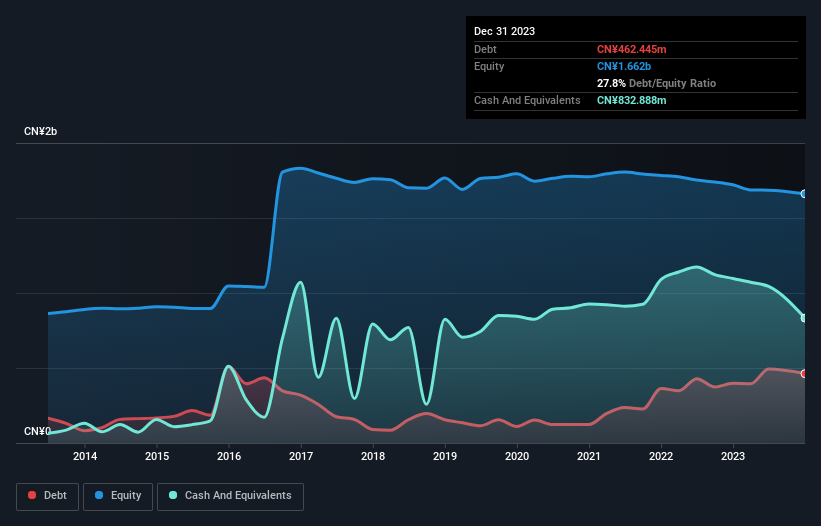
Some say volatility, rather than debt, is the best way to think about risk as an investor, but Warren Buffett famously said that 'Volatility is far from synonymous with risk.' When we think about how risky a company is, we always like to look at its use of debt, since debt overload can lead to ruin. As with many other companies Hongbo Co.,Ltd. (SZSE:002229) makes use of debt. But is this debt a concern to shareholders?
When Is Debt Dangerous?
Debt assists a business until the business has trouble paying it off, either with new capital or with free cash flow. Ultimately, if the company can't fulfill its legal obligations to repay debt, shareholders could walk away with nothing. However, a more common (but still painful) scenario is that it has to raise new equity capital at a low price, thus permanently diluting shareholders. Of course, debt can be an important tool in businesses, particularly capital heavy businesses. When we think about a company's use of debt, we first look at cash and debt together.
See our latest analysis for HongboLtd
What Is HongboLtd's Debt?
As you can see below, at the end of December 2023, HongboLtd had CN¥462.4m of debt, up from CN¥398.5m a year ago. Click the image for more detail. But it also has CN¥832.9m in cash to offset that, meaning it has CN¥370.4m net cash.

How Healthy Is HongboLtd's Balance Sheet?
We can see from the most recent balance sheet that HongboLtd had liabilities of CN¥1.14b falling due within a year, and liabilities of CN¥276.9m due beyond that. Offsetting this, it had CN¥832.9m in cash and CN¥255.7m in receivables that were due within 12 months. So it has liabilities totalling CN¥331.1m more than its cash and near-term receivables, combined.
Since publicly traded HongboLtd shares are worth a total of CN¥9.19b, it seems unlikely that this level of liabilities would be a major threat. Having said that, it's clear that we should continue to monitor its balance sheet, lest it change for the worse. While it does have liabilities worth noting, HongboLtd also has more cash than debt, so we're pretty confident it can manage its debt safely. When analysing debt levels, the balance sheet is the obvious place to start. But it is HongboLtd's earnings that will influence how the balance sheet holds up in the future. So if you're keen to discover more about its earnings, it might be worth checking out this graph of its long term earnings trend.
In the last year HongboLtd wasn't profitable at an EBIT level, but managed to grow its revenue by 14%, to CN¥620m. That rate of growth is a bit slow for our taste, but it takes all types to make a world.
So How Risky Is HongboLtd?
Statistically speaking companies that lose money are riskier than those that make money. And in the last year HongboLtd had an earnings before interest and tax (EBIT) loss, truth be told. Indeed, in that time it burnt through CN¥209m of cash and made a loss of CN¥54m. While this does make the company a bit risky, it's important to remember it has net cash of CN¥370.4m. That means it could keep spending at its current rate for more than two years. Summing up, we're a little skeptical of this one, as it seems fairly risky in the absence of free cashflow. When analysing debt levels, the balance sheet is the obvious place to start. But ultimately, every company can contain risks that exist outside of the balance sheet. We've identified 2 warning signs with HongboLtd (at least 1 which doesn't sit too well with us) , and understanding them should be part of your investment process.
If you're interested in investing in businesses that can grow profits without the burden of debt, then check out this free list of growing businesses that have net cash on the balance sheet.
Valuation is complex, but we're here to simplify it.
Discover if HongboLtd might be undervalued or overvalued with our detailed analysis, featuring fair value estimates, potential risks, dividends, insider trades, and its financial condition.
Access Free AnalysisHave feedback on this article? Concerned about the content? Get in touch with us directly. Alternatively, email editorial-team (at) simplywallst.com.
This article by Simply Wall St is general in nature. We provide commentary based on historical data and analyst forecasts only using an unbiased methodology and our articles are not intended to be financial advice. It does not constitute a recommendation to buy or sell any stock, and does not take account of your objectives, or your financial situation. We aim to bring you long-term focused analysis driven by fundamental data. Note that our analysis may not factor in the latest price-sensitive company announcements or qualitative material. Simply Wall St has no position in any stocks mentioned.
About SZSE:002229
HongboLtd
Engages in the security printing business in China and internationally.
Excellent balance sheet very low.
Market Insights
Community Narratives




